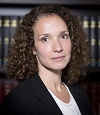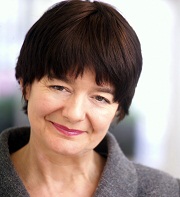Anya Proops QC – 11 King’s Bench Walk Chambers, London
 Anya Proops was one of twenty five women appointed silk in the 2015/16 Competition, alongside eighty two male colleagues. Anya specialises in information rights, media, public and employment law and she is described in the Legal Directories as “tenacious”, “a fierce advocate in court’ and “the outstanding junior counsel of choice for both the Information Commissioner and private clients across the full range of issues in information law”. She is also a formidable advocate on behalf of her female colleagues in seeking the development of a QC application process which recognises the particular challenges which many female barristers face in taking silk, particularly as a result of their child-care responsibilities, as I learned from our fascinating chat in Anya’s 11KBW Chambers.
Anya Proops was one of twenty five women appointed silk in the 2015/16 Competition, alongside eighty two male colleagues. Anya specialises in information rights, media, public and employment law and she is described in the Legal Directories as “tenacious”, “a fierce advocate in court’ and “the outstanding junior counsel of choice for both the Information Commissioner and private clients across the full range of issues in information law”. She is also a formidable advocate on behalf of her female colleagues in seeking the development of a QC application process which recognises the particular challenges which many female barristers face in taking silk, particularly as a result of their child-care responsibilities, as I learned from our fascinating chat in Anya’s 11KBW Chambers.
Anya felt that the QC application process was still surrounded by an unnecessary aura of mystery and that this was why so many applicants felt compelled to seek assistance from consultants, notwithstanding the costs entailed in doing this. She said that she found completing the form a challenging and time consuming exercise, and, whilst the QCA guidance was undoubtedly very helpful, it did not really drive home important points, such as the need to focus on what you did as an advocate that was excellent, as opposed to describing what the case was about. Anya pointed out that she received some “very helpful” advice from the QCA Secretariat on specific queries but said she would be keen to see the written guidance being developed so as to make the process more straightforward for applicants.
Anya added that in her view some elements of the guidance were ambiguous, for example with regard to how the Panel might view an applicant who listed fewer than twelve cases or fewer than eight judicial assessors. Anya was concerned about this ambiguity not least because she felt that the guidance could be read as stating that applicants needed to have 12 or at least eight judicial assessors, and that this was putting off a lot of good applicants, including individuals who had taken time out of their practice to look after children or who had been working on a small number of heavy cases.
Anya’s view was that, if the application process was generally more transparent, applicants would be less inclined to spend money on consultants as part of a process which was already fairly expensive. Greater transparency could also assist chambers in building up a knowledge base to assist future applicants. Since being made silk, Anya had already assisted at 11KBW Chambers in running a seminar for senior juniors contemplating making an application for silk. She said that you could feel quite isolated in applying for silk as people did not tend to broadcast the fact that they were considering applying unless and until they were successful. She said that the more support that chambers could provide to individual applicants the better. She added that anything which improved the transparency of the application process would be welcomed not least because this would help to reduce the considerable stress which the process entails for many applicants.
Prior to making her application for QC, Anya had not given too much thought to applying for silk. However, when the time came to apply, she realised that, looking back over the previous two years of her practice, she had been working on just the sort of cases necessary to enable her to make a credible application for silk. Anya felt very lucky to be in a position to apply, particularly given that she had returned from a lengthy maternity leave in 2012 and had not been working at full speed since then because she wanted to spend time with her young son.
Anya said that the other spur for applying for silk when she did was that many of the cases in her field were cutting edge appellate cases and she did not want to lose out on getting those cases because she was not in silk. Prior to making her application, Anya had frequently been leading juniors and appearing in important appellate cases alongside silks. In the circumstances, applying for silk did not seem to be an entirely fanciful exercise, although she was still fairly daunted by the prospect.
Returning to the subject of women at the Bar, Anya alluded to the continuing very disappointing statistics on the number of women, compared with men, who were taking silk. Anya expressed serious concerns that a significant number of female barristers continued to be deterred from applying for silk because they felt they did not have the requisite number of cases to apply. She pointed out that female barristers will often struggle to compete with their male counterparts on this issue because maternity leave and child care responsibilities mean that many female barristers simply cannot put in the ‘heroic’ hours needed to achieve a critical mass in terms of suitable cases. Anya appreciated that the Panel has to ensure that there is sufficient evidence to establish that an applicant meets the standard of excellence required to take silk. However, referencing the statistics, she expressed concerns that the scales continued to be weighted too heavily against female barristers. She suggested that one practical thing which could be done would be to make the message much more prominent that the Panel will take into account such things as carer responsibilities and part-time working in cases where applicants, whether male or female, could not name the optimal number of cases and/or judicial assessors in the two-year period. Anya added that, given that one of the criteria against which applicants were assessed was their commitment to diversity, the Panel should itself be doing more to ensure that the cadre of silks at the Bar was itself meaningfully diverse. Anya pointed out that the then Chairman of the Panel (one of Anya’s interviewers) had come across to her in the interview as someone who had a very good understanding of the difficulties professional women faced in competing equally with their male peers. However, Anya said that she would like to see more being done in terms of concrete Panel practice and explicit guidance for applicants, so as reduce the disincentives to seeking advancement that female barristers still faced.
Anya also said that she would welcome any steps which the Panel could take to make the competition shorter, as having it ‘hanging over you’ for the best part of a year added substantially to the stress entailed in the process.
© Queen’s Counsel Appointments Ltd
- Date: March 25, 2019
- Category: QCA Profiles 2016


